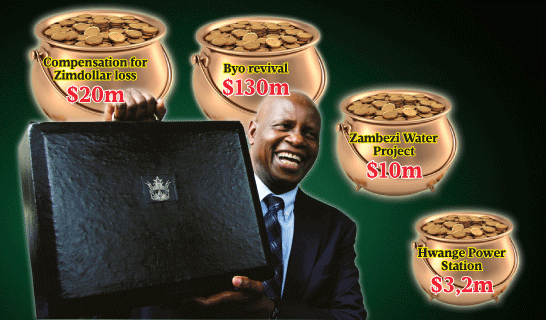
THE national budget presented last Thursday by Finance minister Patrick Chinamasa has been described by many as a Zanu PF wish-list bereft of any clues to solve Zimbabwe’s nagging economic and political problems.
GAMMA MUDARIKIRI OWN CORRESPONDENT
There is a general consensus that the over $4 billion budget is hopeless, populist and lacks substance.
Zimbabwe Congress of Trade Unions (ZCTU) secretary-general Japhet Moyo came out guns blazing charging that the 2014 budget was largely anti-workers and anti-poor.
During the budget consultation process ZCTU had advocated for a pro-poor budget.
But Moyo said the workers’ pleas appeared to have fallen on deaf ears.
“The much-awaited 2014 budget statement has left workers with a sour taste in the mouth after Chinamasa failed to incorporate submissions of labour that were meant to alleviate suffering of the country’s workforce,” Moyo said in a statement.
“ZCTU is seriously concerned that the tone of the budget is anti-worker with the Finance minister making it clear that it is necessary to introduce in our labour laws flexibility in the hiring of workers, as well as align wage adjustment to labour flexibility.
- Chamisa under fire over US$120K donation
- Mavhunga puts DeMbare into Chibuku quarterfinals
- Pension funds bet on Cabora Bassa oilfields
- Councils defy govt fire tender directive
Keep Reading
“In other words, the minister wants employers to pay poor wages as well as allow them to hire and fire without any hindrances,” he added. Moyo threatened that ZCTU would take to the streets in protest of the anti-worker budget.
He said except for the increase in the tax threshold on retrenchment or severance packages, the budget was silent on tax relief for the over-taxed workers and rather proposed new levies on fuel that would be passed on to workers.
Moyo labelled the 2014 budget the worst ever, adding that the government even failed to be clear on how it would deal with the low civil servants’ salaries.
“The ZCTU believes this is the worst budget ever and unfortunately the Zanu PF-controlled Parliament will be forced to approve it, but in true democracies, such budgets would be thrown out through the window,” Moyo added.
The Bulawayo business community had its hopes shattered after the government failed to avail a special financial rescue package for the city in the budget.
Industry players had been pushing for government to revive the now-defunct Distressed Industries and Marginalised Areas Fund or to come with a new rescue package, specifically for companies in Bulawayo which has suffered heavy deindustrialisation.
Bulawayo was the hardest hit by de-industrialisation after closure of close to 100 companies last year while more continue to shut down largely due to lack of working capital, antiquated machinery, erratic power supplies. The budget presented last Thursday was anticipated to provide a solution to this plethora of challenges.
“The industry in Bulawayo was expecting a special financial lifeline, but the minister was silent on the issue,” George Mukamba Bulawayo Business Arise administrator said.
“What industry is in desperate need of, is working capital and without that the outlook for the industry is bleak, we won’t achieve much.”
Economic analyst John Robertson said the economy would not manage to reach the growth target of 6,4% as projected in the budget. Robertson said the government stance to maintain the indigenisation law would further deter the much-needed investment.
“Next year we can only achieve 3% economic growth considering the poor performance of the economy this year”.
“There is nowhere we can reach 6, 4% how do we sustain that,” he said.
The opposition MDC-T charged that Chinamasa’s budget would have a serious negative impact on the ordinary person, saying it does not have measures in place to fund critical sectors to improve the economy and people’s livelihoods.
“The MDC-T notes with serious concern that the 2014 $4,1 billion budget is a wish-list full of assumptions that will not result in meaningful revenue being collected by the government and it does not have measures in place to attract foreign direct investment.
“The 2014 national budget is not pro-poor and the ordinary person will be the most affected by increases on import duty that have been placed on various basic consumables such as milk and milk products.
“Worse still, Chinamasa does not tackle the issue of increasing and supporting the local production in order to boost employment and provide affordable prices.
“Of great concern is the fact that the budget celebrates the death of the formal economy when in reality the informal and formal economies are intertwined. The disappearance of the formal economy goes with the disappearance of the informal economy,” part of the MDC-T statement issued on Friday reads.
“MDC-T said it is imperative that Chinamasa’s budget should have included measures on how best to grow both the informal and formal sectors.
“The measures that have been put in place on diamonds are not strong enough to ensure that remittances from the mineral find their way into government coffers. On indigenisation, the Zanu PF government wants to put in place a patronage system by insisting that for investment purposes, Zimbabweans will use the natural resource as their equity,” the MDC-T added.
The MDC-T said Chinamasa failed to tell the nation how he would bring back confidence in the banking sector, which has seen a biting liquidity crisis with customers failing to access their hard-earned cash.










